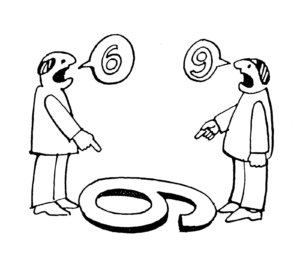Humans have always had an interesting relationship with being right, despite how wrong we are about most things all the time.
On a societal level, we disagree about just how right our leaders need to be. Politicians who change their ideas are derided as weak “flip-floppers” rather than as individuals who saw a change in perspective because of growth and learning new information. As cutting-edge science uncovers new truths that make the old obsolete, many people lose faith in science altogether rather than see finding falsehoods a necessary stop on the path to truth.
It’s easy to look back at decisions we made in the past and see how foolish they are now, but it’s hard to think that in the future, we’ll look back at our present moment ideas with the same disbelief.
Bur rather than recognize that our perspectives are subject to change like everything else, we believe that now, right now, we are right. We are absolutely sure that our way is the way.
And when we encounter someone who thinks differently than we do, or an article online that doesn’t coincide with our worldview, we don’t just notice it and move on in our lives. We resist it. We feel the need to justify ourselves. We get caught up and the mind begins to race, thinking of all the reasons we are right, and why the other person is wrong.

It is this fundamental resistance that forms the mental complex and social delusion we call the ego: that bundle of thoughts, ideas, beliefs and stories we identify with as ourselves. Our sense of “I” is dependent on this sense of “not I,” which necessitates the rejection of ideas and peoples we do not associate with.
We might see ourselves as a Democrat and definitely not a Republican, as a vegan and definitely not a carnivore, as an intelligent person and definitely not like Jonathon from accounting. We might see ourselves as a rebel who distrusts authority, and thus dependent on defining and resisting whatever authority might be at the time.
This ego then goes about pushing those beliefs onto others, who, of course, have their own stories, thoughts and beliefs about the world, and don’t like being told they’re wrong either. This is why the Buddha taught “Those who cling to perceptions and views wander the world offending people.”
The question we must ask ourselves is: do we want to be right all the time and tell everyone else why they are wrong? Do we want to endlessly justify our beliefs and impose our opinions on others? Do we constantly want to be triggered when someone on social media or on TV says something we disagree with?
Or can we rest in the unknown? Can we see that every viewpoint is a view from a specific point?

In Buddhist and other spiritual communities, there is a huge emphasis on what is called “not knowing.” We are told to empty our cup so true spiritual wisdom can permeate our awareness. The same insight is found in 1 Corinthians 3:18, “Make no mistake about it: if any of you think of yourselves as wise, you must learn to be ignorant first, and then you can become wise.”
This is known as cultivating a “don’t know mind.” A don’t-know-mind is humble. A don’t-know-mind is peaceful, happy, content. A don’t-know-mind understands our limited mind can never fully know the complexities of the universe.
While we may look to science for clues on where the real truth lies, ask any Ph.D. about their research and they will all tell you the same thing: “There’s a lot we don’t know.”
Think about all the scientific literature that exists and all the knowledge that it entails. Think about every chemistry, physics, and psychology textbook ever printed. That is a lot of knowledge. Now, ask yourself: what fraction of all the total possible knowledge of the universe is encapsulated in what we know now? If we had a trillion scientists studying for a trillion years, how much more could be discovered?
Socrates is known to have said, “All I know is that I know nothing,” and Albert Einstein is reported to have similarly quipped, “The more I learn, the more I realize how much I don’t know.” The deeper we go into any discipline or any knowledge base, we learn just how much is waiting to be discovered; from the oceans to the stars, from inner space to outer space.
How many times have you made a right decision that turned out to be a wrong one? How many times have you made a seemingly insignificant decision that had drastic consequences? How many times have you firmly believed in one thing, only for a few years to pass and you believed in the exact opposite?
No one knows what is going to happen tomorrow. The past is an illusion, and a malleable one at that. A don’t-know-mind can rest in the unknown mysteries and paradoxes of the universe, which is actually what allows us to be fully present in the here and now.
As Pema Chodron put it, “we can’t be present and run our storylines at the same time.” Rather than wanting things to be different from a place of egoic desire, we stop resisting and full rest in the constantly changing moment.
So, this all begs the question: can we let go of the need to be right all the time? Can we affirm we deserve peace—real peace—that naturally results when we stop resisting the world?
Ask yourself right now, do you want to be right or do you want to be happy?
This line of inquiry will lead us deep into the nature of our emotions, ego, and suffering. The Buddha taught that life is suffering not because life itself is pain in some grand abstract sense, but because we believe things should go a certain way. Suffering in a Buddhist sense is simply anytime anything is not the way we want it to be.
This is to say we have a working model of how we expect the world to be. When things happen that don’t follow that model, we suffer. We get frustrated and angry or feel sad and helpless.
Another incredible question for inquiry can be, “When things don’t go my way, how do I respond?” How do you respond when life doesn’t unfold according to your carefully laid out plans?
Oftentimes when life doesn’t go our way, we get angry. Soon that anger becomes divisive. Look at anger and you will find it is always pushing against something and creating separation. It closes our hearts and alienates us from each other. We become what Chogyam Trungpa calls “a bundle of tense muscles defending our existence.”
The way out of suffering then is not making the world fit our desires but by releasing those desires altogether. Cultivating the middle way of nonattachment that lets things be as they are and allows the moment to unfold exactly as it is.
Releasing our attachment to ego and our usual way of seeing things is one of the most important steps on the spiritual path. As the Franciscan priest Richard Rohr put it in his book, The Naked Now, “whatever you call it, calm egoless seeing is invariably characteristic of people at the highest levels of doing and loving in all culture and religions.”
So too the question, “do I want to be right, or do I want to be happy?”, is a question every person in a relationship needs to ask themselves during any argument.
I have written before about how successful couples do not argue to win, but argue to understand. If you are trying to win your partner over to your side, you have already lost. The goal in any conversation should be to honor of the other’s subjective and equally valid reality.
However, it is important to take this one step further by letting go of the supposed “rightness” of our own point of view and look at why we hold on so tightly to beliefs in the first place. In societal life, we tend to defend our political views, but in relationships, it’s quite different. We argue over the right way to load the dishwasher, or which side of the room the couch should face.
In relationships, we realize just how silly and arbitrary our thoughts often are and how they are so often rooted in the past. This isn’t because it’s the “better way”, but because it’s the way we’re used to. That’s the way our parents did it, so we do it the same way.
Nearly every argument would end if both partners realized how silly they are for even pretending they know the right thing to do all the time. In fact, there would be nothing to argue over, no positions to defend, no egos hurt by the other not understanding them.
There would just be two content people, laughing at the strange and mysterious human condition, who have chosen to be happy over the need to be right.









